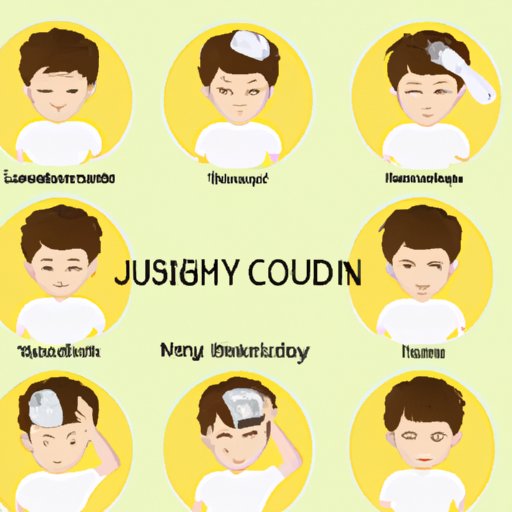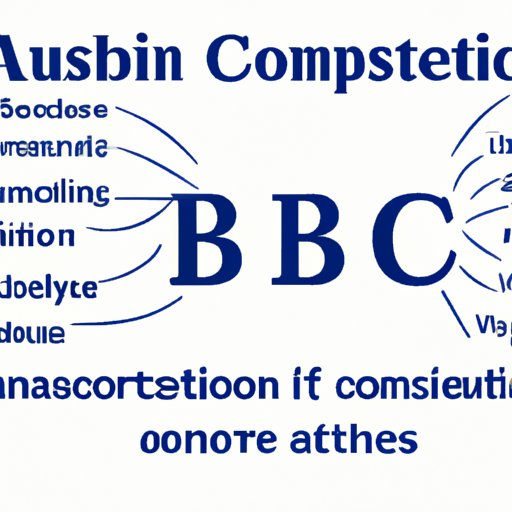
Introduction
A concussion can occur from a variety of incidents, whether it be a head injury during contact sports, a fall, or a car accident. These types of injuries can be concerning, as they affect the brain and can lead to temporary or long-term issues. It’s essential to recognize the symptoms of a concussion to get prompt medical attention and avoid future complications. In this article, we’ll take a closer look at the symptoms of a concussion to help you identify any warning signs that might require medical attention.
10 Common Symptoms of a Concussion: What You Need to Know
The following are the ten most common symptoms that a person with a concussion may experience:
1. Headache
A headache is extremely common after any head injury and can vary in intensity and location. A headache that worsens or persists, even after taking over-the-counter medication, may indicate a more serious issue.
2. Dizziness
Dizziness can cause a sensation of spinning or feeling lightheaded. It usually occurs immediately after injury, but if it persists, it could be a sign of a more severe concussion.
3. Nausea or vomiting
Feeling nauseous or vomiting is very common after a head injury. It can be caused by dizziness or pressure to the head and is usually temporary. However, if vomiting persists, it could be a symptom of a more severe concussion, and medical attention should be sought.
4. Fatigue
Fatigue or excessive sleepiness is often felt after a concussion. The impact can cause the brain to work harder, leading to exhaustion. If someone with a concussion gets easily tired or has trouble staying awake, it could be a sign of a more severe injury.
5. Confusion or disorientation
A concussion can cause a feeling of confusion or disorientation, making even routine tasks difficult. You may feel lost, unsure of where you are, or unable to complete sentences or thoughts.
6. Memory loss or forgetfulness
Memory loss or forgetfulness is common after a concussion. You may have difficulty recalling events that happened shortly before or after the injury. This type of memory loss or forgetfulness typically improves on its own, although it may take some time.
7. Blurred vision or double vision
A blow to the head can cause issues with vision such as blurred or double vision. It is important to have an eye examination if these symptoms occur to rule out any other issues.
8. Sensitivity to light or sound
Concussions can cause heightened sensitivity to light and sound. Some people may find that they are more reactive to these triggers, which can cause pain or discomfort.
9. Mood changes, such as irritability or depression
Changes in mood, such as irritability, anger, depression, or anxiety, can be symptoms of a concussion. These types of issues may present later than other symptoms and could last longer than your physical concussion symptoms.
10. Sleep disturbances
Concussions can cause difficulty sleeping or lead to an increase in sleep. A person may wake up during the night and have trouble falling back asleep or feel tired throughout the day.
Concussion Warning Signs: How to Recognize Them
It’s important to note that some warning signs may point to a more severe concussion, especially if they occur within the first 24-48 hours after a significant head injury. Here are some of the significant warning signs you should know and quickly address, whether it is for you or someone else:
1. Loss of consciousness
If someone loses consciousness after a head injury, they should seek medical attention immediately and be assessed for concussion symptoms.
2. Seizures or convulsions
Any seizure or convulsion activity post a head injury would be an essential warning sign. Such symptoms should be addressed immediately by a medical professional.
3. One pupil larger than the other
Dilation of the pupils that is not equal between both eyes could signify a concussion. Seek medical attention if this occurs.
4. Slurred speech
Speech difficulties in the aftermath of a head injury may indicate a concussion.
5. Weakness or numbness in arms/legs
Symptoms of weakness or numbness in arms or legs, whether unilateral (on one side) or bilateral (both sides), could be a potential sign of head injury. These symptoms need medical attention.
6. Unsteady walking
Unsteady walking or poor balance could be a sign of an undetected concussion. Medical attention is essential should there be doubts.
7. Agitation or restlessness
If the person is restless or agitated after an injury, this indicates the need for immediate medical attention. Monitoring the person’s vitals and consciousness is vital.
8. Worsening headache
If you have a throbbing headache that gets worse or lasts longer than expected, this could be a warning sign of a concussion. Medical attention might be necessary to address it.
9. Persistent vomiting
Prolonged vomiting or worsening symptoms could be a sign of a more severe injury. Medical attention is necessary.
10. Clear fluids draining from the nose or ears
Clear drainage from the nose or ears, especially if it’s following a head injury could be a sign of cerebral spinal fluid, signaling a skull fracture, which is an emergency. Seeking immediate medical attention is crucial.
Head Injury? These Are the 5 Symptoms of a Concussion You Should Never Ignore
While most mild concussions will resolve on their own or with treatment, some symptoms require medical attention, and not addressing them immediately could lead to severe consequences. The following are five symptoms of a concussion that you should never ignore:
1. Severe or worsening headache
If your headache does not improve over time and gets more severe, it could be due to a more severe concussion or brain injury and requires immediate medical attention.
2. Repeated vomiting
Prolonged or recurring vomiting can be a sign of severe head trauma and may indicate a dangerous pressure build-up in the brain. Seek medical attention immediately.
3. Seizures or convulsions
Seizures, whether they occur simultaneously or at different timings after head trauma, signify a severe brain injury and require immediate medical evaluation.
4. Weakness or numbness in arms/legs
Numbness or weakness in the arms, legs, or other extremities is a sign of a severe head injury and requires medical attention.
5. Loss of consciousness
Losing consciousness after a head injury requires immediate attention. Go to an emergency room or call 911 immediately.

The ABCs of Concussion: Understanding Symptoms and Treatment
When responding to a suspected concussion, remember the ABCs:
A – Assess the situation
Check for any visible injuries to the head or neck, call out to the person, and evaluate their responsiveness.
B – Be alert for symptoms
Ask them about symptoms because, after an injury, someone may be more parameter to head injuries that are not visible on the outside. Watch for any signs or changes in their behavior or physical conditions.
C – Contact a healthcare provider ASAP
Seek immediate medical attention if you notice any warning signs or symptoms. Even if you think it’s nothing, it’s always safer to get an assessment.
Treatment options
Treatment for mild concussions involves rest and the avoidance of all physical activity. You should also avoid consuming alcohol and tranquilizers after an injury. If you have severe symptoms, medications may be prescribed, or cognitive therapy may be required.
Beyond the Headache: Surprising Symptoms of a Concussion
While some symptoms are more apparent, others not so much. Here are some surprising symptoms beyond the headache that a person could experience after a concussion:
1. Balance problems or uncoordinated movements
Poor balance or uncoordinated movements can occur with a concussion. You may feel dizzy or have difficulty walking or standing.
2. Changes in taste or smell
A blow to the head can affect your sense of taste or smell, leading to subtle changes in your perception of food or fragrances.
3. Ringing in the ears (tinnitus)
Ringing, buzzing, or other sounds in the ears could be caused by a concussion and may be accompanied with hearing loss or other auditory symptoms.
4. Chronic pain
After a concussion, some people experience chronic pain that can last for months or years, even with the help of medication.
5. Personality changes or behavior abnormalities
A concussion can also cause changes in personality, such as irritability or aggression, or behavioral abnormalities such as struggling with problem-solving or decision-making.
The Invisible Injury: How to Spot the Symptoms of a Silent Concussion
Sometimes after an injury, symptoms may take several days or weeks to appear, or they may suddenly become more severe. This type of concussion is usually difficult to see or diagnose, making it harder to manage. Here’s what to look for:
Defining the term “silent concussion”
A silent concussion refers to the absence of visible injury or reported symptoms. Such a concussion is referred to as a “silent” concussion because the injury is internal, in the brain, and not visible from the outside.
Why it’s important to recognize these symptoms
Even if there’s no obvious head trauma, and you still feel like something’s not right, you must seek medical attention as soon as possible. Symptoms may include fatigue, difficulty concentrating, and other subtle changes in cognitive or sensory function.
Concussion: What to Look For and When to Seek Medical Attention
If you suspect that someone may have a concussion, it’s essential to determine if they require medical attention. Here are some of the key things you should consider:
Recap of essential symptoms and warning signs to watch for
A concussion can have various symptoms, and some may not be immediate after the injury. Knowing what to look for, including common symptoms and warning signs, can help you know when to seek medical attention and receive timely treatment.
When it’s appropriate to see a doctor or go to the emergency room
If you suspect someone has a concussion, it’s better to see a doctor. You should seek medical attention immediately if there are any visible injuries or if any vital signs, such as loss of consciousness, seizures, or shortness of breath, are not stabilized. Seek treatment from a specialized concussion clinic or a healthcare facility knowledgeable about treating head injuries.
The importance of seeking prompt treatment for a concussion
Prompt treatment helps prevent long-term damage and complications. Until you receive medical help, the person with a concussion should avoid any physical activity and take time to rest so that the brain can heal. This not only helps speed up the recovery process but can also prevent further injury.





